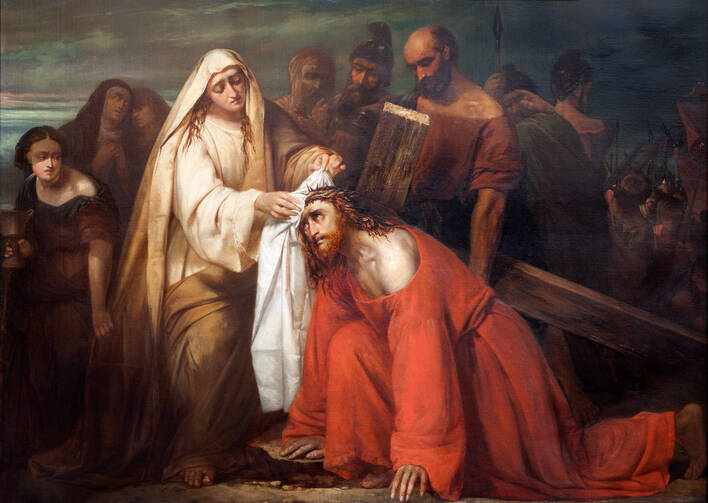Good Friday changed St. Veronica. Her example changed my work ...
Photo via iStock
For one year I had the privilege to serve as the assistant Catholic chaplain at California State Prison-Sacramento, a maximum-security prison, through the Jesuit Volunteer Corps. At first, I struggled to find a succinct way of expressing what my work as a prison chaplain meant to me in terms of my faith. But on Good Friday, as I was praying the Stations of the Cross with the people inside the prison, I finally found a fitting image for my experience at the sixth station: “Veronica Wipes the Face of Jesus.”

This station represents the moment when Veronica, a woman standing along Jesus’ way to Calvary, was moved with compassion and used her veil to wipe his face. Tradition tells us that upon wiping off the dirt, blood, sweat and tears that would have certainly covered his face, the cloth Veronica used then displayed an image of the face of Christ. Reflecting on this moment in Christ’s Passion took me back to one of the most outstanding moments I witnessed in my position.
In addition to leading Communion services, running restorative justice programs and offering contemplation and spiritual-reading groups, I occasionally accompanied the full-time Catholic chaplain in delivering death notices, that is, informing prisoners that someone they know on the outside has died. I was present at several death notices, but none stood out to me in the profound way this one did.
The prisoner (whom I will call Sam) had lost his mother. Losing a parent is not easy, but losing a parent while in prison can be particularly heart wrenching. Sam was housed in the Psychiatric Services unit, where prisoners who committed rules violations and who receive significant mental-health treatment are housed, so a mental-health clinician was also present during the death notice. Further complicating the situation was the fact that someone had informed Sam of his mother’s death earlier in the day without a chaplain or clinician present. Therefore, Sam had already been suffering this loss on his own, locked away in his cell, without any support.
The conversation with Sam was overwhelmingly sad. After the chaplain and the clinician had spent some time asking Sam questions about how he felt, about his relationship with his mother and about what he needed in that moment to grieve in his own healthy way, we all sat with Sam as he called his sister on the phone. She gave her brother more details about their mother’s death, made sure he was going to be safe and let him know how much she loved him. At one point, I felt my own heart drop within me as Sam, with tears in his eyes, asked his sister, “Am I gonna be O.K.?”
As one might imagine, by the time Sam ended his phone call with his sister, his face was soaked with tears—and his nose was dripping with mucus. But because Sam was housed in the Psychiatric Services unit, he was required to have his hands cuffed behind his back throughout the entire death notice. Wiping his face on his shoulder only did so much, and so, although he desperately needed a tissue, there was no way for him to wipe his face himself.
Suddenly, the chaplain paused, picked up a roll of toilet paper (which was all we had for tissues), and said, “I know it’s a little unconventional, but would you like me to clean you up a bit?” Sam, probably more than a little surprised, pondered the chaplain’s offer for a moment, nodded and leaned forward so the chaplain could reach his face. The chaplain used a few bunches of toilet paper to wipe Sam’s eyes, nose and face. I was stunned.

This extremely compassionate gesture had completely changed the energy in the room, transforming it into a place that felt safe and sacred, a place where real vulnerability was welcome and held. The gesture itself was, as the chaplain put it, “unconventional”—one grown man wiping the wet and snotty face of another grown man. However, the fact that it occurred inside a prison—often better known for isolation or aggression—made it seem all the rarer.
I continue to learn from this moment. Like Veronica’s simple yet compassionate act, this moment of breaking through convention to make space for real vulnerability speaks volumes. Prison is a place of walls, both literal and emotional, walls of feigned invincibility, of machismo (for prisons housing mostly men) and of disaffectedness. From what I have heard and witnessed, the chapel is one of the few places where those walls can be let down. And in my own experience as a prison minister, those walls often crash down. The specific type of vulnerability I have experienced in the chapels of California State Prison-Sacramento is unlike any I have experienced on the outside. The stories of and desires for personal authenticity I have encountered here are unmatched.
As chaplains, we do our best to model our actions after Veronica. The compassionate gesture she offered Jesus certainly did not remove the pain and suffering that Jesus endured and that he continued to endure on his way to Calvary. However, it fully recognizes and offers dignity to the suffering Jesus endures. It has the power to change how he suffers. Jesus has experienced in her touch, and in her kindness, true compassion. In that moment he does not suffer alone. Someone has seen it, someone has responded to it—even if in a simple way. I hope that the chaplain’s gesture created space within Sam’s own heart for him to feel seen, to allow him to be himself while in a painful place.
After that encounter, I sought to emulate the gesture of the chaplain and of Veronica in my own ministry at the prison. In preparing for my year of service, I watched a number of videos collected on the website of Catholic Prison Ministries Coalition. In many of these videos, presenters would describe prison ministry as a “ministry of presence,” and Veronica’s wiping of Jesus’ face has helped me more clearly understand that term. I have learned that so much of the efficacy of prison ministry relies upon simply showing up. To listen with compassion and empathy is the soul of prison ministry. Therefore, I would constantly check in with myself: Am I creating a space for people to share themselves vulnerably and thereby to invite God into challenging parts of their lives? Am I making space for others and myself to inhabit ourselves more honestly and authentically, even if doing so presents challenges? If I could not answer these questions affirmatively, I learned I was selfishly serving myself rather than the people I claimed to serve.
The impact of the encounter between the chaplain and Sam also followed me in my life outside of the prison. I continue to seek moments that stretch me into vulnerability and authenticity, and I now daily challenge myself to let others support me and see me for the whole person I am, including the parts of me that hold pain. I let others wipe my face, so to speak.
I do not believe I really learned how to be vulnerable and authentic until I began prison ministry. In the past, I more often felt pressured in faith circles to arrive clean, pure and holy rather than to accept and work through the hard parts of myself. I was encouraged every day by many of the people to whom I ministered in the prison—people who modeled vulnerability and honestly strove to live into their own goodness—to step into my own authenticity by sharing myself and my story with others.
Just as Veronica received the true image of Jesus upon extending her compassion to the suffering God, so I believe my own time in prison ministry has changed me. It has imprinted upon me God’s unique image, that is, the image of an incomprehensibly big God who is with those who suffer most. It has made my own heart more spacious. The unique vulnerability of the people I encountered inside a California prison has helped me to become more compassionate, more vulnerable and more truly myself.













































